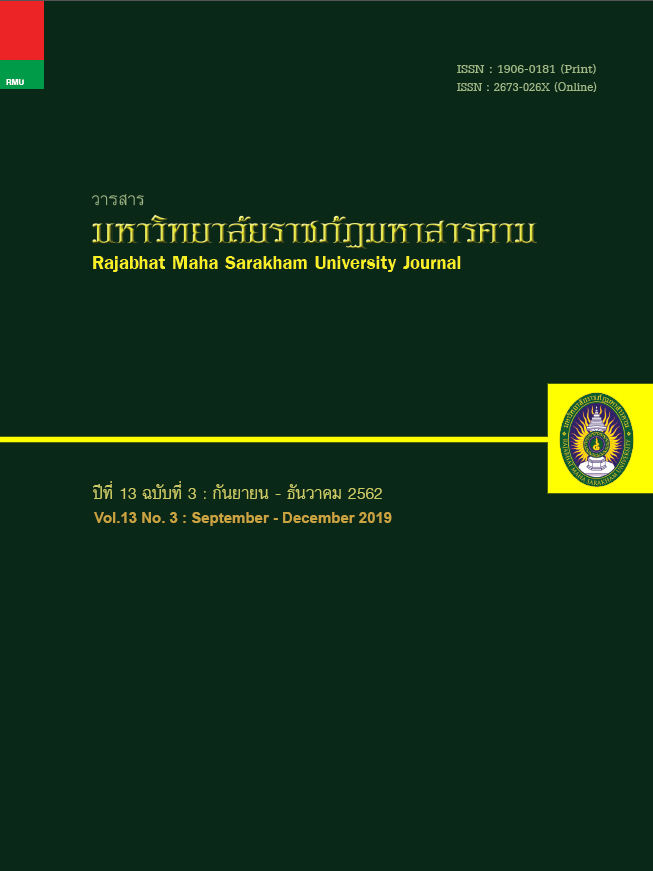การพัฒนากลยุทธ์การตลาดท่องเที่ยวเชิงประสบการณ์ กรณีศึกษาย่านเมืองเก่า จังหวัดอุบลราชธานี
Main Article Content
บทคัดย่อ
การวิจัยครั้งนี้มีวัตถุประสงค์เพื่อศึกษาลักษณะด้านประชากรศาสตร์และพฤติกรรมการท่องเที่ยวความคิดเห็นเกี่ยวกับปัจจัย ส่วนประสมทางการตลาดท่องเที่ยวการเปรียบเทียบความแตกต่างของนักท่องเที่ยวและการพัฒนากลยุทธ์การตลาดท่องเที่ยวเชิงประสบการณ์ย่านเมืองเก่า จังหวัดอุบลราชธานี ใช้การวิจัยเชิงปริมาณโดยการสำรวจด้วยแบบสอบถามจำนวน 400 ชุด ผลการวิเคราะห์ค่าความเชื่อมั่นของแบบสอบถาม (Reliability) โดยใช้วิธีการหาค่าสัมประสิทธิ์แอลฟา (Alpha-Coefficient) มีค่าเท่ากับ 0.948 แสดงว่าแบบสอบถามมีค่าความเชื่อมั่นสูงกำหนดขนาดกลุ่มตัวอย่างโดยใช้สูตรของยามาเน่วิธีการเลือกแบบบังเอิญ สถิติที่ใช้ในการวิเคราะห์ข้อมูลประกอบด้วย ความถี่ ร้อยละ ค่าเฉลี่ย ส่วนเบี่ยงเบนมาตรฐานการทดสอบสถิติที (t-test) และการวิเคราะห์ความแปรปรวนทางเดียว (One-Way ANOVA) กำหนดระดับนัยสำคัญทางสถิติที่ระดับ 0.05 หากพบว่ามีความแตกต่างจะวิเคราะห์ความแตกต่างรายคู่ โดยวิธี Scheffe ผลการวิจัยพบว่าผู้ตอบแบบสอบถามชอบการท่องเที่ยวที่ให้ประสบการณ์ความแปลกใหม่ เดินทางมาท่องเที่ยวเป็นครั้งแรกและไม่ค้างคืน เพื่อนเป็นผู้มีอิทธิพลในการเดินทางมากที่สุด วางแผนการเดินทางไม่แน่นอน รับรู้ข้อมูลข่าวสารจากคำบอกเล่าผู้ตอบแบบสอบถามมีความคิดเห็นต่อส่วนประสมการตลาดท่องเที่ยว (5Ps) และผลสัมฤทธิ์การตลาดท่องเที่ยวเชิงประสบการณ์ ในภาพรวมและรายด้านอยู่ในระดับมาก ผลเปรียบเทียบความแตกต่างของปัจจัยส่วนประสมทางการตลาดท่องเที่ยวและผลสัมฤทธิ์การตลาดท่องเที่ยวเชิงประสบการณ์ พบว่าผู้ตอบแบบสอบถามที่มีอายุและรายได้ต่างกัน มีความคิดเห็นต่อส่วนประสมทางการตลาดท่องเที่ยวแตกต่างกันทุกปัจจัย รองลงมา อาชีพ สถานภาพและเพศ ตามลำดับ ส่วนระดับการศึกษาและลักษณะความสนใจไม่มีความแตกต่าง ผู้ตอบแบบสอบถามที่มีรายได้ต่างกันมีความคิดเห็นต่อผลสัมฤทธิ์การตลาดท่องเที่ยวเชิงประสบการณ์แตกต่างกันทุกปัจจัย ข้อสรุปจากงานวิจัยสามารถเป็นแนวทางกำหนดตลาดเป้าหมายและกลยุทธ์การตลาดท่องเที่ยวเชิงประสบการณ์ให้เป็นที่รู้จัก จดจำและกลับมาเที่ยวซ้ำ
Article Details
1. บทความที่ลงตีพิมพ์ทุกเรื่องได้รับการตรวจทางวิชาการโดยผู้ประเมินอิสระ ผู้ทรงคุณวุฒิ (Peer Review) สาขาที่เกี่ยวข้อง อย่างน้อย 3 ท่าน ในรูปแบบ Double blind review
2. ข้อคิดเห็นใด ๆ ของบทความที่ลงตีพิมพ์ในวารสารมหาวิทยาลัยราชภัฏมหาสารคาม นี้เป็นของผู้เขียน คณะผู้จัดทำวารสารไม่จำเป็นต้องเห็นด้วย
3. กองบรรณาธิการวารสารมหาวิทยาลัยราชภัฏมหาสารคาม ไม่สงวนสิทธิ์การคัดลอกแต่ให้อ้างอิงแสดงที่มา
เอกสารอ้างอิง
Ministry of Tourism and Serice. (3 October2017).National Tourism Development Plan 2nd (2016-2021).From website:http://mots.go.th/ewt_dl_link.php?nid=8370.
Kotler and Amstrong (2012). Principles of Marketing.14thed. New Jersey: Pearson Education
Lovelock, Christopher & Wirtz ,Jocher. (2004). Services Marketing : People, Technology,Strategy. United States of America : Pearson Prentice Hall.
Tichakorn Jariyaporn.(2018). Marketing factors influencing Thai tourist to travel HuaHin night market. (Master's thesis) Program in Hospitality and Tourism Industry Management, Graduate School, Bangkok University.
Thanit Butthipsakul.(2015). Tourist's behaviors on religion tourism at Buddhist temples in Nan province. Academic Journal Institute of Physical Education, 9(1),63-76.
Chalongsri Pimonsompong.(2011). Tourism Planning and Marketing Development. Bangkok: Kasetsart University Press.
Walaiporn Rewtrakunphaiboon.(2008).Future tourist’s behavior trends. International Thai Tourism Journal, (1), 1-12
Ali, F., Ryu, Ki.,and Hussain,K. (2016). Influence of experience of experience on memories, satisfaction and behavioral intention : A study of creative tourism. Journal of Travel & Tourism Marketing,33(1), 85-100.
Adul Jaturongkul and Dalaya Jaturongkul. (2007). Consumer Behavior (2nd Edition). Bangkok :Thammasat Printing house.
Thanya Promburomand Narumon Kimpakorn.(2015). Factors Affecting Tourist experience of Eco, Culture, and Wellness Tourism in the Upper Nortthern Provincial Cluster 1 of Thailand: Chiang Mai, Lamphun, Lampang, Maehong son. Journal of Thai Hospitality and Tourism, 10(1), 71-87.
Pimrawee Rocharungsat.(2018). Developing Local Food Image Management Model to Increase Tourist Loyalty: Case study of Phetchaburi. Journal of International and Thai Tourism, 14(1), 1-16
Jirawat Anuwichanont. (2011). Tourism marketing and Service. SuanDusit Rajabhat University,Bangkok, Dharmasarn Company Limited.
Phattaraporn Timdangand Winai Panjajajonsak. (2011).A Model of experiential Marketing for Foreign Tourist. Journal of the Association of Researcher,16(3),89-101.
Wu H-C.&Li T.(2014). A Study of Experiential Quality, Perceived Value, Heritage Image, Experiential Satisfaction, and Behavioral Intentions for Heritage. Journal of Hospitality & Tourism Research published (online).
PennapaPengprapai (2016). The Influence of Marketing Mix on Thai and Foreign Tourists’ Interest in Socio–Cultural Tourism at KohPhangan, SuratThani. (Independent Study Master degree) Program in HospitalityIndustry and Tourism Management Bangkok University.


